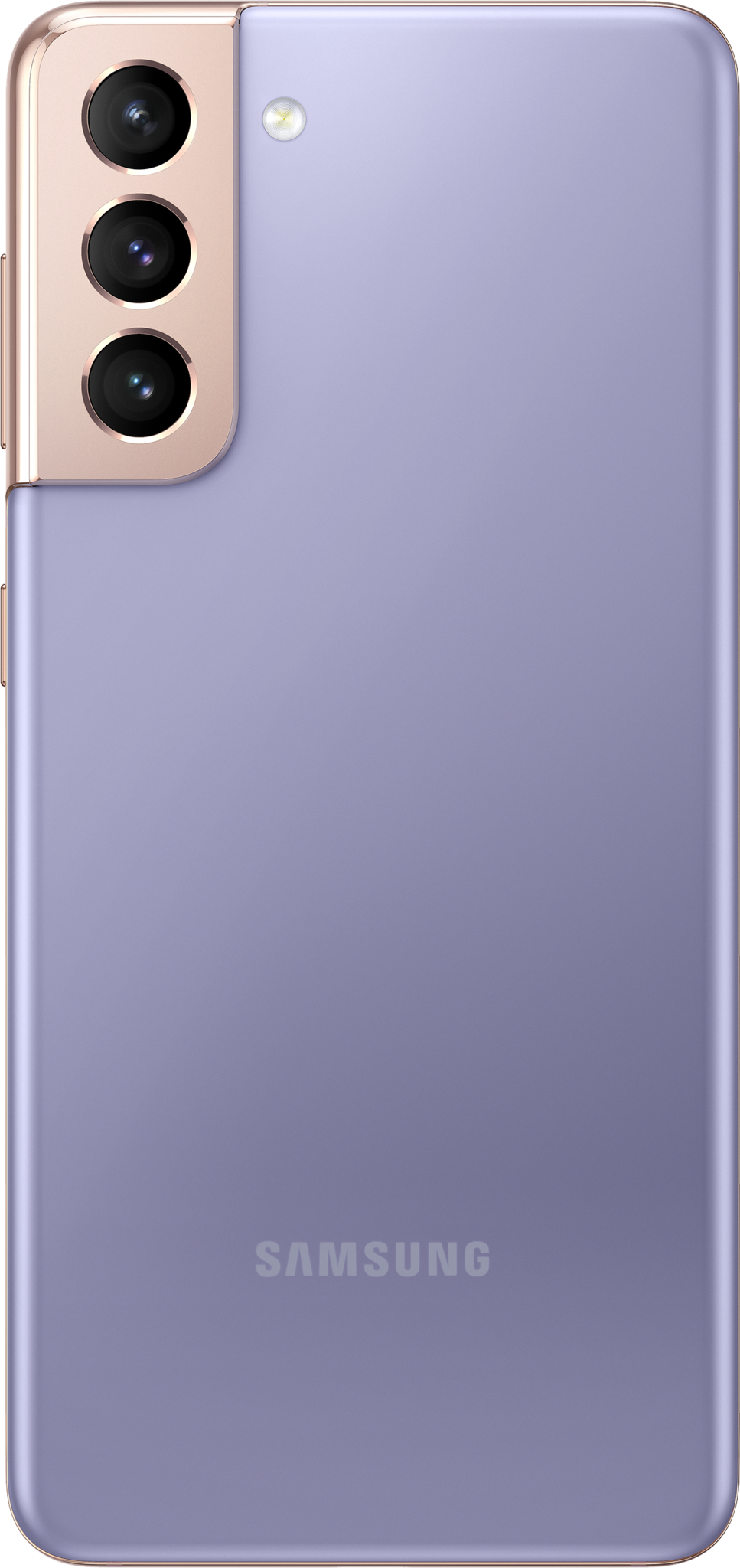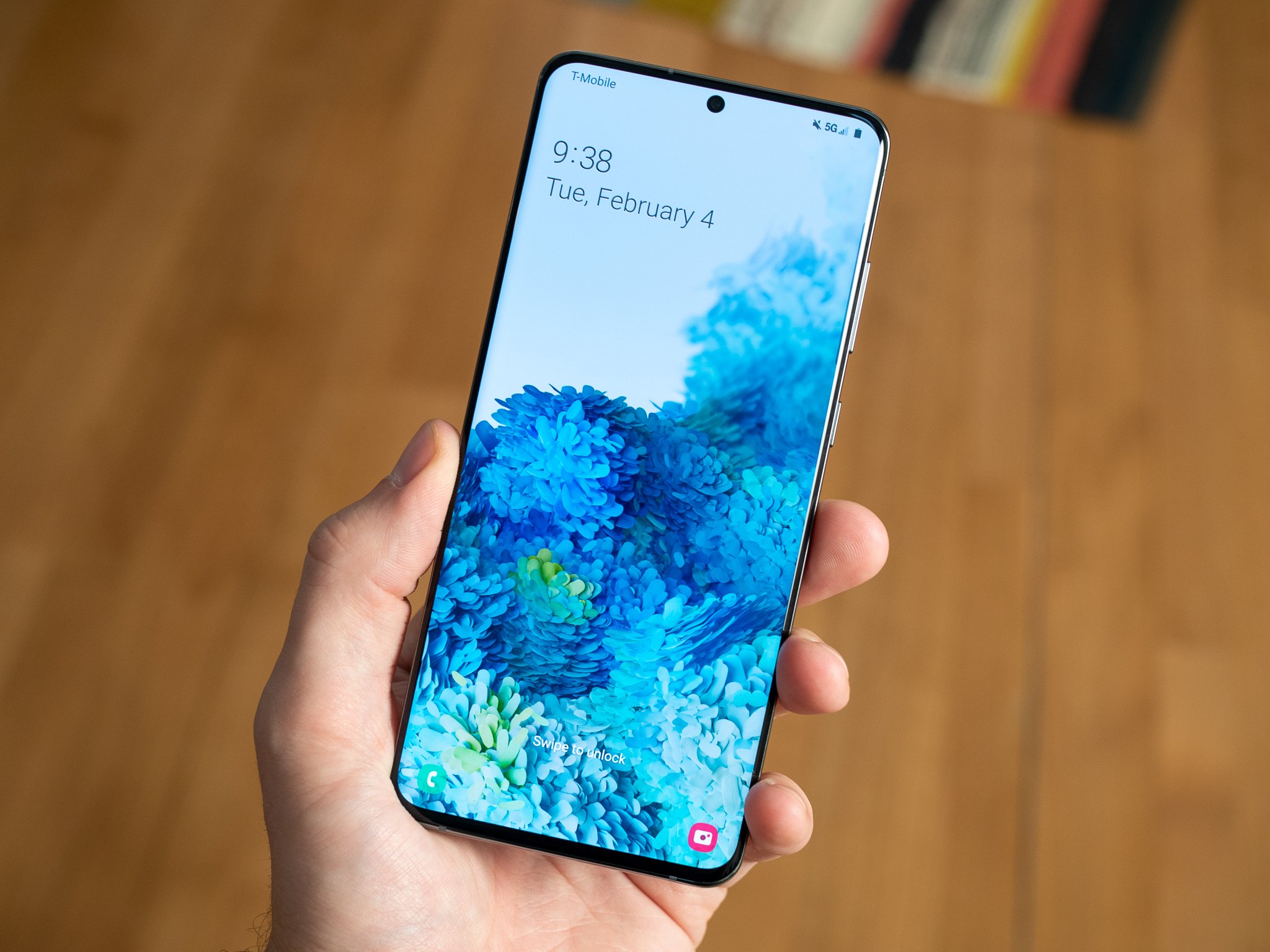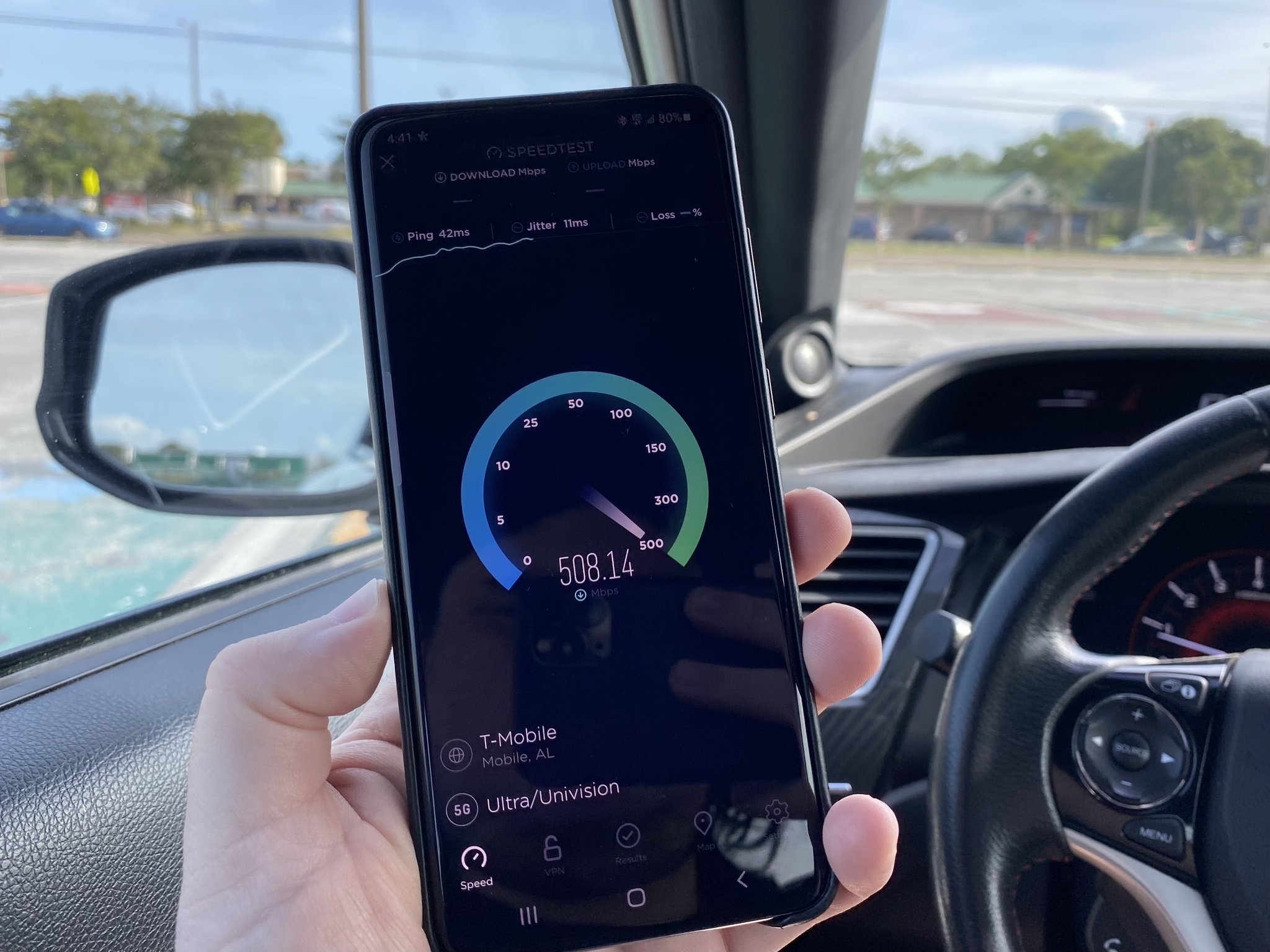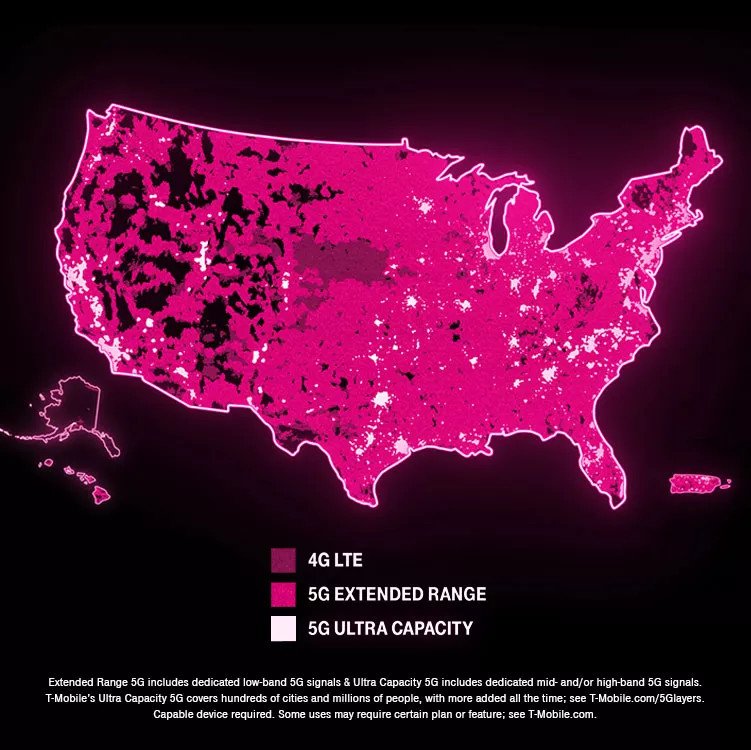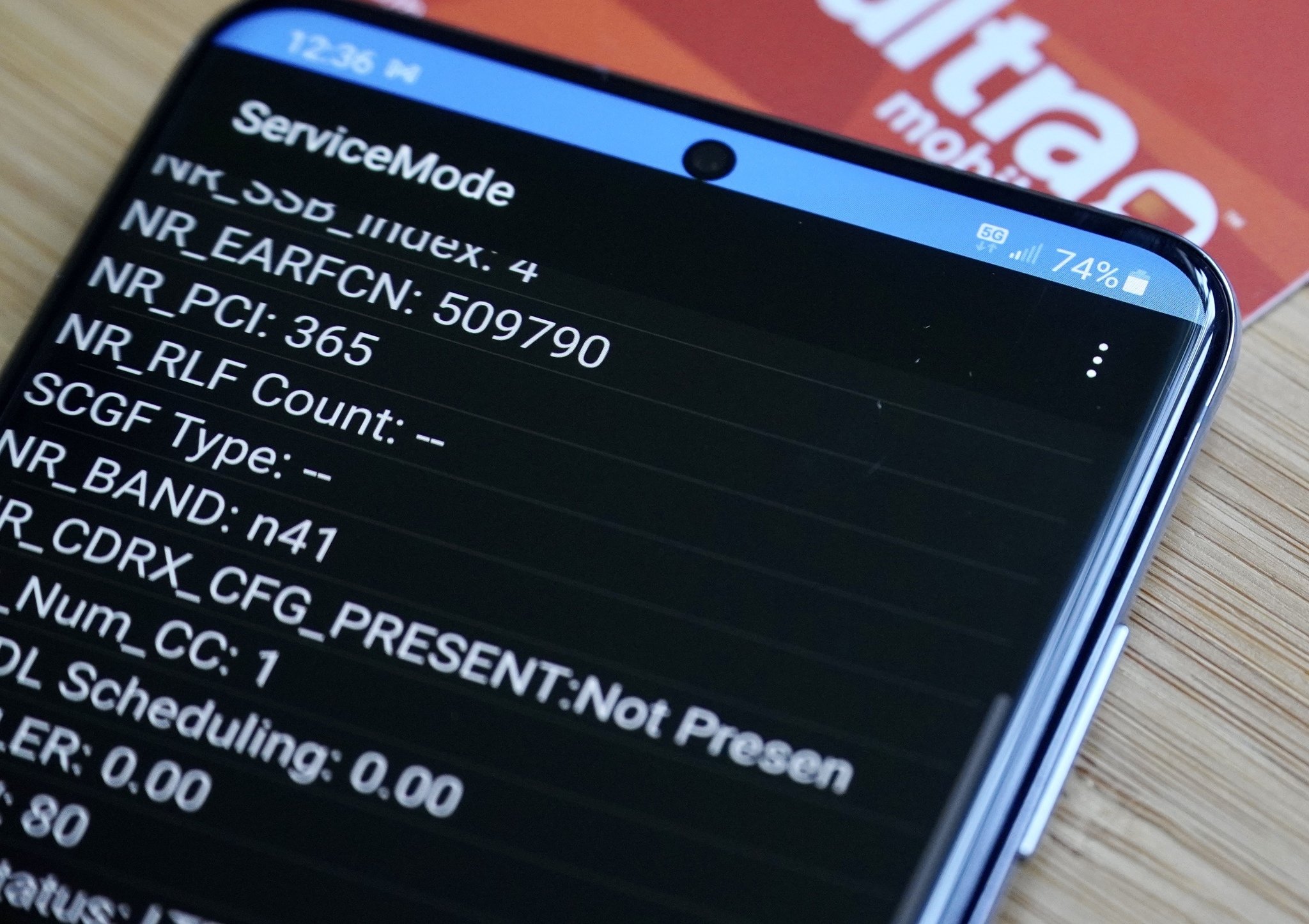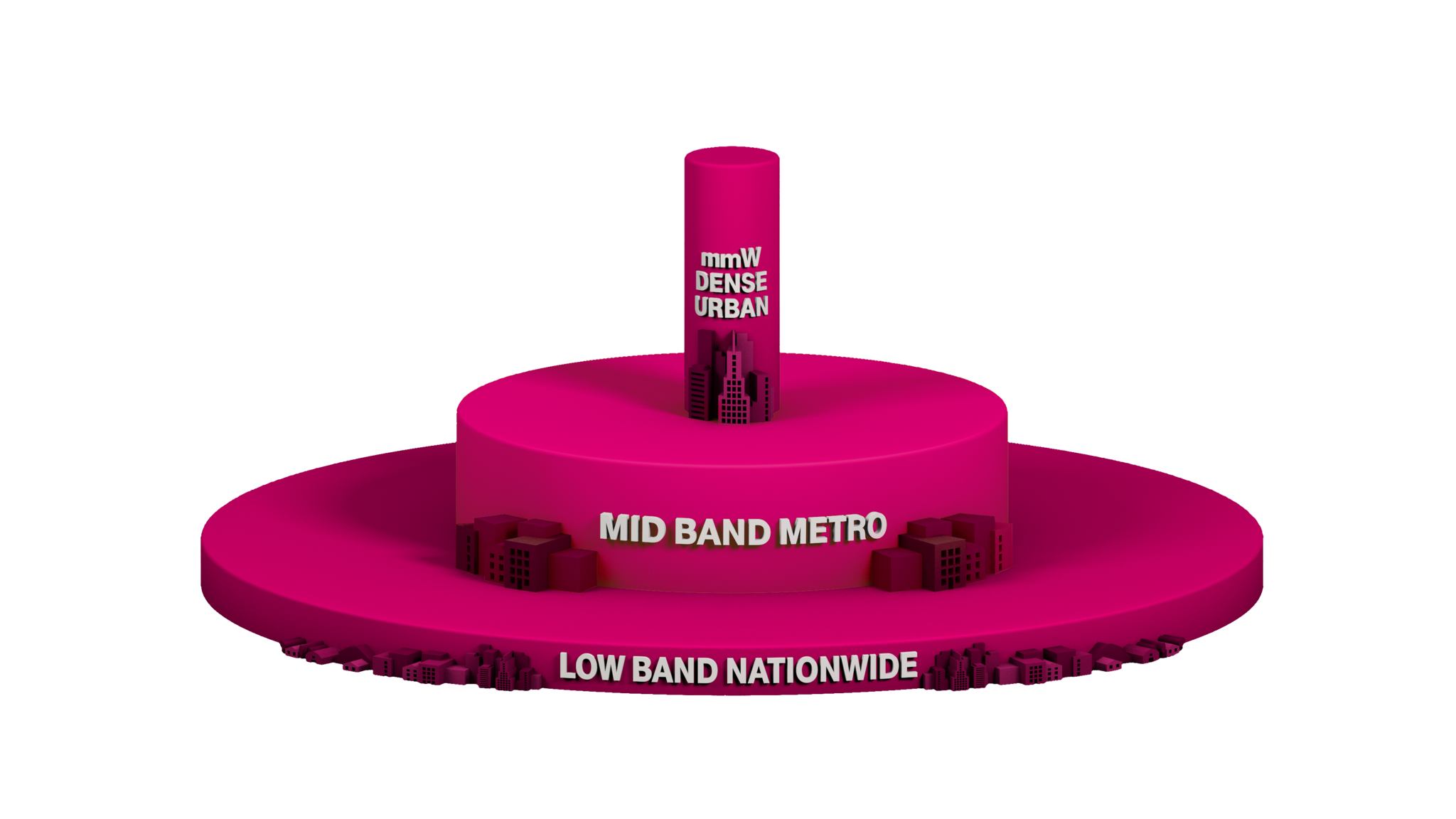Here's everything you need to know about 5G on T-Mobile and Sprint
Tons of spectrum and coverage
T-Mobile has one of the most ambitious 5G plans of any carrier out there, and with its purchase of Sprint, T-Mobile has a ton of spectrum and a great platform to build a strong 5G network. T-Mobile has already deployed a nationwide 5G network on its low-band Extended Range 5G spectrum and is adding even more speed and capacity with its Ultra Capacity 5G spectrum. T-Mobile also has mmWave spectrum that has been deployed in a few cities. This combined network is poised to be one of the strongest in the nation.
Jump to:- Do I have 5G coverage?
- Which phones work with 5G?
- Which plans supoprt 5G?
- How is T-Mobile's 5G network different?
- What happens to Sprint 5G customers?
- Is 5G worth it?
- What is 5G For Good?
Most people that have T-Mobile 5G coverage right now are covered by a low-band network built on its 600MHz band n71 spectrum. T-Mobile calls coverage on this band Extended Range 5G. Reclaimed from broadcast TV, Extended Range 5G has allowed T-Mobile to upgrade its existing towers with 5G equipment and provide the same level of coverage people have come to expect from 3G and 4G.
T-Mobile states that it already covers 308 million people with Extended Range 5G with Ultra Capacity available to over 200 million people. With a large number of urban and suburban areas now covered by the faster Ultra Capacity network, T-Mobile customers are starting to see massively improved speeds. T-Mobile has also upgraded its network to standalone 5G, which means your phone doesn't need to connect to an LTE network to then connect to 5G.
The best way to know if you're covered is to check the T-Mobile coverage map. T-Mobile also shows the places where it has Ultra Capacity 5G on its map so you can get a good idea of what kind of speeds will be available to you.
While our initial tests weren't that impressive, we have since seen improved results on our tests of T-Mobile prepaid options like Ultra Mobile.
T-Mobile is still building a high-band, millimeter wave, 5G network in a few cities. This deployment of 5G is on bands N260 and N261 at 39Ghz and 28Ghz, respectively. With some coverage in New York, Los Angeles, Las Vegas, Dallas, Cleveland, and Atlanta, the number of cities is high compared to other carriers, but the actual 5G coverage is still quite low. C-band spectrum will also be used in the next couple of years to add a bit of capacity in a few key areas where T-Mobile expects high traffic.
Which phones work with T-Mobile 5G?T-Mobile phones will be compatible with different networks depending on their software and hardware. For the most part, most of the best Android phones will work with T-Mobile's 5G. With T-Mobile's growing 5G coverage and plenty of new phones with 5G support, if you're buying a new phone, it should have 5G.
To be sure you get the best possible results from T-Mobile's network, make sure your new phone supports both band n71 and band n41. Most newer 5G phones, including those from Samsung, Google, and even Apple, will support the full network.
T-Mobile is using the 2.5GHz spectrum it got from Sprint to bolster its own 5G network and, to do so, has taken the Sprint 5G network down. Sprint customers with a Galaxy S20 device got an update that enabled access to T-Mobile's 5G network, but that's it. Older devices like the Galaxy Note 10+ 5G or OnePlus 7T Pro 5G will not be getting an update to support T-Mobile's 5G.
All T-Mobile plans come with 5GAll T-Mobile plans can access the 5G network, which is great since some of the best cell phone plans you can get use the T-Mobile network. T-Mobile makes no distinction between its networks, so any customer with a compatible phone should be able to access it. This has also carried over to T-Mobile Prepaid and MVNOs such as Mint Mobile and Google Fi. T-Mobile has also enabled 5G on all Sprint plans.
Boost Mobile is now owned by Dish and is transitioning its customers to the new T-Mobile network with the goal of eventually moving all of its customers to its own standalone 5G network.
What tech is T-Mobile using for 5G?5G comes in several different forms with a variety of results depending on what resources a carrier can throw at it. T-Mobile started with high-band 5G on 28Ghz and 32Ghz bands. With this network, T-Mobile should be competitive with what Verizon and AT&T have been doing once the network has more time to mature. This high-band deployment should be capable of very high speeds, but building penetration and coverage are much more limited than we're used to with 4G.
T-Mobile launched a 600Mhz, low-band, Extended Range 5G network in December of 2019. With new equipment, T-Mobile was also able to update its 4G LTE service on the same tower. AT&T and Verizon have also deployed low-band 5G networks with similar coverage capabilities.
Of course, there's Sprint's 2.5GHz spectrum. We got an early look at Sprint's 5G, which was a good indicator of things to come. T-Mobile has more than 160MHz of spectrum at 2.5GHz in the top 100 US markets and has already shut down Sprint's 5G network and its Ultra Capacity 5G built on the same spectrum covers more than 200 million people.
On August 4, 2020, T-Mobile launched its standalone 5G (5G SA) network. 5G SA can work alone without devices needing to connect to an older, less efficient LTE network first. Previously, 5G phones required this existing infrastructure to work properly.
Functionally, this is essentially the same network as before with some nice improvements. According to T-Mobile's announcement, 5G SA improves coverage by 30 percent since phones will no longer need to connect to a mid-band LTE signal that doesn't reach as far a 5G at 600MHz. While there were still many improvements with non-standalone 5G compared to LTE in speed, the 5G network was held back. T-Mobile estimates a 40 percent improvement in latency thanks to the switch, which should help data access be much more immediate.
What happens to Sprint's 5G customers?T-Mobile's purchase of Sprint is complete, and with it comes great potential. Many people will have flashbacks to older failed mergers, but T-Mobile points to its well-handled Metro PCS integration as a model for this joining. T-Mobile estimates that fully integrating the networks will take up to three years so however, both Sprint and T-Mobile customers are starting to see some new benefits.
Sprint customers have gained access to LTE roaming on the T-Mobile network when Sprint's signal is low. Also, Sprint customers with the Galaxy S20 can now connect to T-Mobile's 5G network, including low-band 600MHz 5G as well as the 2.5GHz 5G network. Sprint customers looking for 5G can switch to a T-Mobile SIM if they have a compatible phone or are ready to upgrade.
Is T-Mobile 5G worth it?On T-Mobile, it comes down to if you want the phone because there is no current separation of plans. Most new phones you can buy for T-Mobile support 5G, so most new T-Mobile customers and upgrading existing customers will be using the network. If you're looking for a good reason to upgrade your phone, 5G isn't it, but it's a nice perk when you do upgrade.
While 4G LTE will continue to be fast enough for most people for a few years into the future, eventually, everyone will transition to 5G. Still, speed improvements have been consistent, and T-Mobile has been hitting its coverage goals throughout 2021, so if you've been waiting for 5G to mature before signing on, now's the time.
What is 5G for Good?5G for Good is an initiative to use the power of 5G to help the community. While some people have accused T-Mobile of putting on a show to grease the government's wheels in approving its merger with Sprint, it's nice to see technology making a positive impact on the world.
It's worth noting that all of the projections here depend on the merger going through, and T-Mobile likely won't be able to get it done without the extra spectrum from Sprint.
Connecting Heroes InitiativeThe Connecting Heroes Initiative is a program that intends to bring free 5G access to first responders in America. This includes public and non-profit law enforcement, fire, and EMS agencies. It's first-come, first-serve for those that sign up, so if you want your agency to get connected on 5G, get registered as soon as possible.
Project 10MillionIt's been shown that children without access to the internet likely won't receive as good an education as those that do. Of course, this is also linked to income inequality.
Project 10Millions aims to eliminate the homework gap caused by millions of children not having access to the internet for school work. The project intends to offer free service, hotspots, and reduced-cost devices to 10 million households over the next five years.
T-Mobile ConnectT-Mobile connect is simply a low-priced phone plan with access to the 5G network. Plans are offered at $15 per month for unlimited talk and text with 2.5GB of high-speed data. There is also a $25 per month plan with 5.5GB of data. Interestingly, the plan is set to grow as usage does by increasing the data allowance by 500MB a year for five years. This is by no means a huge amount, but for a low-income family, this can be a lifesaver.
These plans are already available on T-Mobile prepaid.
The next big thing in connectivity5G: Everything you need to know